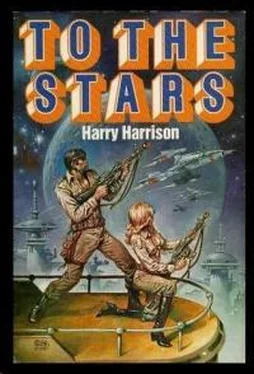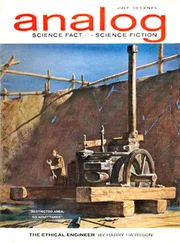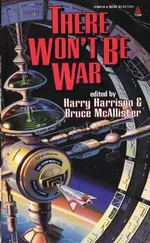Гарри Гаррисон - To The Stars
Здесь есть возможность читать онлайн «Гарри Гаррисон - To The Stars» весь текст электронной книги совершенно бесплатно (целиком полную версию без сокращений). В некоторых случаях можно слушать аудио, скачать через торрент в формате fb2 и присутствует краткое содержание. Жанр: Фантастика и фэнтези, на английском языке. Описание произведения, (предисловие) а так же отзывы посетителей доступны на портале библиотеки ЛибКат.
- Название:To The Stars
- Автор:
- Жанр:
- Год:неизвестен
- ISBN:нет данных
- Рейтинг книги:3 / 5. Голосов: 1
-
Избранное:Добавить в избранное
- Отзывы:
-
Ваша оценка:
- 60
- 1
- 2
- 3
- 4
- 5
To The Stars: краткое содержание, описание и аннотация
Предлагаем к чтению аннотацию, описание, краткое содержание или предисловие (зависит от того, что написал сам автор книги «To The Stars»). Если вы не нашли необходимую информацию о книге — напишите в комментариях, мы постараемся отыскать её.
To The Stars — читать онлайн бесплатно полную книгу (весь текст) целиком
Ниже представлен текст книги, разбитый по страницам. Система сохранения места последней прочитанной страницы, позволяет с удобством читать онлайн бесплатно книгу «To The Stars», без необходимости каждый раз заново искать на чём Вы остановились. Поставьте закладку, и сможете в любой момент перейти на страницу, на которой закончили чтение.
Интервал:
Закладка:
“Exactly! Films like this, I imagine.”
They entered a workshop, but Curtoni led Jan away from the machines and instruments to an ordinary TV set with a row of chairs before it. Curtoni keyed in a code and turned the set on.
“Sit, enjoy,” he said. “This is an archaic film from the dawn of history that I found buried in the memory files. It is about a war among the stars, there — see!”
Music exploded from the loudspeaker, and on the screen a mighty spacer flashed by. It had turrets and windows, gun emplacements and energy guns. Close behind was its pursuer, an even larger spaceship. Mighty rays and beams lashed out from the ships, lights flashed and there was the constant roar of engines, the zapping and crashing of the rays, There was a quick cut to a man in a turret, wheeling it about to fire his ray guns as the other ship swooped close. Luckily the smaller ship darted aside in time and fled for safety behind a nearby moon. Then the screen went blank and the roars and music died away.
“What do you think about that?” Curtoni asked.
“Very little. Seemed like fun, though.”
“Merda! Fun for infants in arms perhaps. But technically it is a monstrosity. Not one fact — not a single one — is scientifically correct. There is no sound in space, ships do not stop or turn suddenly, human reflexes are worthless in spacecraft maneuvering or warfare, ray guns do not work…”
“I’ll give you all that. I suppose I never really thought about it before. But don’t dismiss the rays so quickly. I’ve worked with fusion cannon. They turn rock to lava in a few seconds.”
“Of course!” Curtoni held his hands out in the air, about a hundred centimeters apart. “When the rock is this far away. What about a hundred meters away? Would it set fire to a piece of paper? Or a thousand kilometers, which is practically touching in space, when it would probably look like a light bulb if you could see it at all. The propagation of light, the propagation of any form of energy…”
“Of course, varies in proportion with the inverse square of the distance. I wasn’t thinking.”
“Exactly! No one ever does until they are face to face with the problem. Which is why I show everyone my little training film first. It makes a point. Another point is that space war is so close to impossible that it can be called highly improbable.”
“But we’re fighting one now, aren’t we?”
Curtoni switched on the apparatus on one long bench and shook his head no. “We are fighting a rebellion, with Earth ships standing up to Earth ships. A real war, with ships from different civilizations coming from distant stars. Bunkum, like that thing we just saw. Even Earth’s Space Force never planned for a war. When hostilities began only a few of their ships had weapons. Installed but never used since the Commonwealth had absolute control of space and all of the spacers. They thought one or two might be seized some time, so prepared their weapons just in case. And all of the same simple design. And what would that be?”
“Missiles obviously, adapted from those already designed for use in the atmosphere.”
“Perfectly correct. And how long do you think it would take us to design, develop and test our own missiles?”
“Years. Even if you captured some and copied them, the manufacture of circuitry, control systems… probably just about as long.”
“Perfectly correct. It is a pleasure to speak with an intelligent man — that is of course someone who agrees with me. So we dropped the missile approach, though of course we have some on the Space Force ships that we took over. It was more important to develop defenses first which we did by copying and modifying the Earth detection systems. We see the missiles coming, then generate electronic fields to mislead their guidance systems. For offense we have taken a more simple line. Like this.”
He picked up a small finned piece of metal from the bench and bounced it in his hand.
“That’s a slug from a rocket pistol,” Jan said.
“Perfectly true. And a better weapon in space than it ever can be on a planet. No gravity to drop it, no air to slow it.”
“Or guide it. The fins are useless.”
“Again you are right, Jan. It had to be redesigned with the thrust ahead of the center of gravity. Very simple. Even simpler to mount a number of firing tubes on a turret and have the whole thing controlled by the navigation computer. Put a flock of these things into space in front of a spacer and you have a wreck. Speed equals mass and a few grams of metal will impact with tonnes of force. Good-bye enemy.”
Jan turned the tiny rocket over and over in his fingers. “I do see one or two problems. Distance and speed, or rather they’re both the same thing. You can’t pack enough thrust into something this tiny.”
“Of course. These are mostly for defense. For attack we have developed this.”
He turned to the work bench and picked up a small metal ball, then pressed a button on the control board. Jan could hear a faint humming sound, and when Curtoni held the sphere close to a vertical metal ring secured to the bench it sprang from his hand and hung, suspended, in the center of the ring. There were other rings mounted close together down the length of the bench. When Curtoni pressed a second button there was a whistling sound and a flash and the sphere vanished. A loud crack echoed from the other end of the compartment as it crashed into the thick plastic sheet, hung there and dropped to the deck.
“Linear accelerator,” Jan said. “Just like the ones on the Moon.”
“Exactly the same. The large Lunar models take containers filled with ore and shoot them right out of the Moon’s gravity, to the Lagrange satellite colonies for processing. As you see a magnetic field is created in the first electromagnet ring. It suspends the iron sphere. Then, when the series of electromagnets are activated, they act as a linear motor, moving the sphere along faster and faster until it shoots out of the far end.” He turned and picked up a larger sphere that nestled comfortably in his hand.
“This seems to be the most practical size we have discovered by trial and error. It weighs a little under three kilograms, which is almost exactly six pounds in one of the more archaic systems of measurement. When I was researching this project I was helped a good deal by early ballistic texts that dealt with muzzle velocities and like terms. I was fascinated to find out that primitive sea battles were actually fought with solid shot of just this weight. History has many lessons for us.”
“How far have you gone with the project?” Jan asked.
“Four deep spacers have been converted to cannon ships. This is one of them. Named after one of the earliest theoreticians of the science who made such incredible drawings of his weapons. Leonardo da Vinci. We have loaded these ships with hundreds of thousands of cannonballs which have been forged in space from satellite iron. Most easily too. The specified mass of molten iron is released in free fall, whereupon its surface tension forms it into a perfect sphere. The secret weapons run the length of the ships and project from each end. The entire ship is rotated to aim the cannon, with aiming and firing controlled by the navigation computer. It all works well except for one small fault.”
“What’s that?”
“Bugs in the control circuitry. The spheres must be launched within microseconds of each other to be effective. But we haven’t been able to do this yet.”
Jan threw the cannonball back onto the bench and smiled. “Let me see your documentation and your diagrams and I’ll do my best to get rid of your bugs.”
“Instantly! You will win this war for us yet!”
Seventeen
Интервал:
Закладка:
Похожие книги на «To The Stars»
Представляем Вашему вниманию похожие книги на «To The Stars» списком для выбора. Мы отобрали схожую по названию и смыслу литературу в надежде предоставить читателям больше вариантов отыскать новые, интересные, ещё непрочитанные произведения.
Обсуждение, отзывы о книге «To The Stars» и просто собственные мнения читателей. Оставьте ваши комментарии, напишите, что Вы думаете о произведении, его смысле или главных героях. Укажите что конкретно понравилось, а что нет, и почему Вы так считаете.


![Гарри Гаррисон - Bill, the Galactic Hero [= The Starsloggers]](/books/87536/garri-garrison-bill-the-galactic-hero-the-star-thumb.webp)





